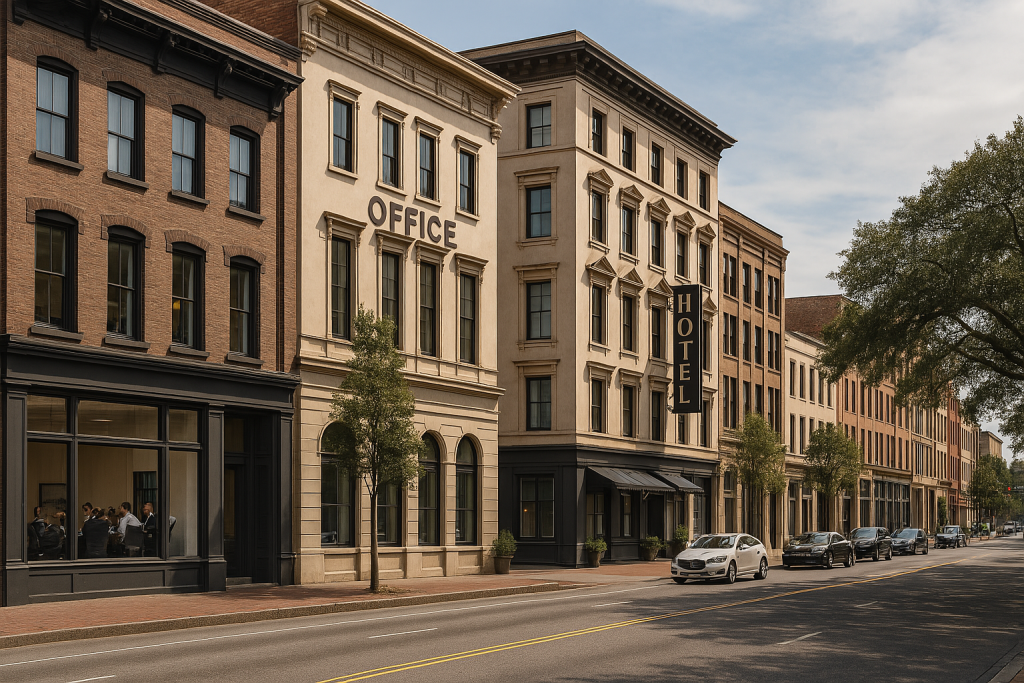Office Space Dynamics & Hotel Conversions in Savannah, GA

Presented by Professional Advice LLC & the Savannah Business Directory
Savannah’s historic charm isn’t just drawing tourists—it’s reshaping the commercial real estate market. Over the past few years, the city’s distinctive architectural appeal, booming tourism sector, and favorable business climate have converged to ignite a shift in the urban landscape: the conversion of prime downtown office properties into boutique hotels.
The Shift: Office to Hotel
What began as a subtle trend has become a dominant force in downtown development. Once home to law firms, marketing agencies, and creative studios, many of Savannah’s class B and C office buildings are being repurposed into high-end accommodations. The cause? A dramatic uptick in tourism, coupled with investor confidence in the hospitality sector.
According to recent data, Savannah hosted more than 18 million visitors in 2023, generating over $4 billion in direct tourism spending. Developers, eager to capitalize on this growth, are scooping up centrally located office spaces and transforming them into short-stay lodging to meet rising demand. In turn, this has created a ripple effect across the local business ecosystem.
Record-Low Office Vacancies
With fewer traditional office buildings available, Savannah’s office vacancy rate has plunged to below 2% in key commercial corridors, including the Historic District and the rapidly evolving Eastern Wharf area. For small business owners and professional firms seeking downtown addresses, the market has become increasingly competitive.
What was once an abundance of mid-tier office space is now a tightly held commodity. Long-term tenants are being outbid or displaced by redevelopment plans, while startups and expanding firms are often forced to look to the suburbs or neighboring cities like Pooler and Bloomingdale for space—an option that may not align with branding or clientele.
Implications for Small Business Owners
For small business owners, particularly those in professional services, tech, and design industries, this dynamic presents both a challenge and a decision point.
Accessibility, walkability, and proximity to clients and collaborators remain key priorities. Yet with diminishing downtown availability, businesses are either adapting by embracing hybrid work models or by paying a premium to stay in central locations. Lease rates have increased by as much as 10-15% in some areas over the past year alone, and incentives for long-term leases are growing scarce.
Meanwhile, coworking and flexible office providers are beginning to fill some of the gaps. Spaces like The Creative Coast and Expansive Savannah are seeing increased interest as businesses seek interim or shared solutions to avoid being priced out.
A Wake-Up Call for CRE Professionals
For commercial real estate professionals, the conversions represent both a wake-up call and an emerging opportunity. The demand for well-located office space remains strong, particularly for class A developments offering parking, connectivity, and modern amenities. The downtown shortage has opened a rare window for developers to fill a widening gap in the market.
Savannah’s economy continues to diversify, fueled by the port, logistics, manufacturing, and tech sectors, each of which generates sustained demand for office infrastructure. With most recent investment funneled toward residential and hospitality, office development has lagged, creating an under-supplied, high-demand niche.
Professionals who move quickly to acquire, reposition, or build office product in strategic zones could find themselves ahead of the curve. Localized site selection, historic preservation credits, and mixed-use incentives may further improve ROI in certain districts.
The Long-Term Picture
As Savannah continues to attract new residents and investment, the city will need to balance tourism growth with the needs of a professional workforce. Hotel conversions have revitalized many aging buildings and contributed to the city’s vibrant aesthetic, but they’ve also exposed vulnerabilities in the commercial fabric.
City planners, zoning boards, and development authorities may soon be forced to reconsider usage policies and incentives. The future could involve rezoning, public-private partnerships, and integrated planning to preserve enough space for local enterprise alongside the booming visitor economy.
In the meantime, Savannah’s commercial market stands as a case study in rapid transformation—where charm, commerce, and competition intersect. The office space crunch is real, and how professionals respond to this evolving dynamic will help define the next chapter of the city’s economic story.